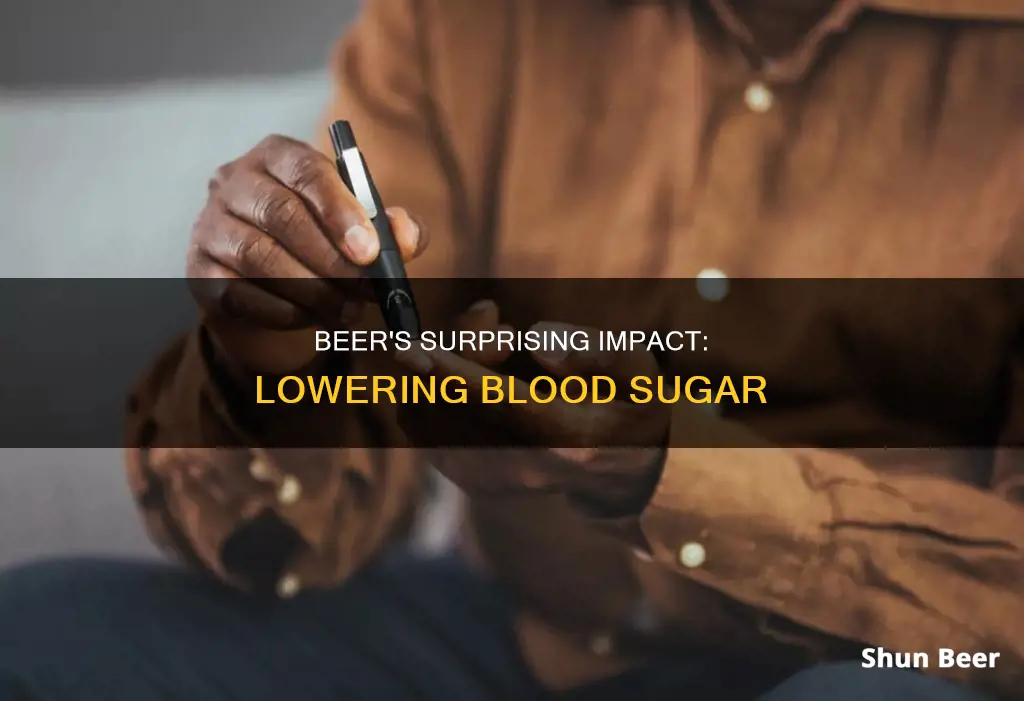
Drinking alcohol can have a significant impact on blood sugar levels, especially for people with diabetes. Alcohol is a depressant that affects every organ in the human body and influences how the liver regulates blood sugar. For people with diabetes, drinking alcohol may cause blood sugar levels to rise or fall. Beer and sweet wines contain carbohydrates and may raise blood sugar, while excess alcohol can lead to a dangerous drop in blood sugar levels. This is because the liver prioritises breaking down alcohol over releasing glucose, which it normally does to maintain blood sugar levels. This effect can last for hours after drinking, and the more alcohol consumed, the greater the risk of low blood sugar. Therefore, it is recommended that people with diabetes who choose to drink alcohol do so in moderation, only after consulting a doctor, and always with food to help maintain normal blood sugar levels.
| Characteristics | Values |
|---|---|
| Alcohol's impact on blood sugar | Alcohol can cause blood sugar to rise or fall |
| Alcohol's impact on insulin | Alcohol can reduce insulin effectiveness and interfere with oral diabetes medications |
| Alcohol's impact on appetite | Alcohol stimulates appetite, which can cause overeating and affect blood sugar control |
| Alcohol's impact on weight | Alcoholic drinks are high in calories, making it harder to lose weight |
| Alcohol's impact on judgment | Alcohol can affect judgment and increase the chance of making unhealthy food choices |
| Alcohol's impact on triglyceride levels | Alcohol may increase triglyceride levels |
| Alcohol's impact on blood pressure | Alcohol may increase blood pressure |
| Alcohol's impact on the body | Alcohol can cause flushing, nausea, increased heart rate, and slurred speech |
| Alcohol's impact on medication | Alcohol may interfere with diabetes medications |
| Alcohol's impact on liver | Alcohol reduces the liver's ability to regulate blood sugar |
What You'll Learn
- Beer and sweet wine contain carbohydrates and may raise blood sugar
- Alcohol stimulates your appetite, which can cause you to overeat and may affect your blood sugar control
- Alcohol can interfere with the positive effects of oral diabetes medications or insulin
- Alcohol may increase blood pressure
- Alcohol can cause flushing, nausea, increased heart rate, and slurred speech

Beer and sweet wine contain carbohydrates and may raise blood sugar
Beer and sweet wines are not the only alcoholic drinks that contain carbohydrates. For example, liqueurs such as Amaretto and Kahlua, as well as Sambuca, Cointreau, and Bailey's Irish Cream, contain up to 30 grams of carbohydrates per 5-ounce serving.
The occasional cocktail or glass of wine is not necessarily harmful. However, for people with diabetes, alcohol consumption can affect blood sugar levels. Alcohol can interfere with blood sugar levels and the hormones needed to maintain healthy blood sugar levels. It can also reduce the effectiveness of insulin over time, resulting in high blood sugar levels.
People with diabetes must be cautious when consuming alcohol. It is recommended that they check their blood sugar levels before and up to 24 hours after drinking. They should also check their blood sugar levels at bedtime to ensure they are stable before sleeping.
Is Root Beer Safe for Children to Drink?
You may want to see also

Alcohol stimulates your appetite, which can cause you to overeat and may affect your blood sugar control
Alcohol can indeed stimulate your appetite, leading to overeating and affecting your blood sugar control. This is due to several physiological factors, including:
- Alcohol suppressing the oxidation of fatty acids, which are essential for appetite regulation.
- Alcohol increasing short-term thermogenesis, or calorie utilisation, leading to faster hunger sensations.
- Alcohol stimulating or inhibiting neurochemical systems that regulate appetite. It particularly affects the hormones leptin and GLP-1, which suppress appetite.
- Alcohol stimulating the same neurons in the brain that are triggered when the body goes into starvation mode, leading to increased hunger sensations and possibly overeating.
- Alcohol reducing self-control, making it harder to resist food cravings and overeating.
Research has shown that alcohol doesn't increase general hunger but rather increases hunger once eating has begun. Additionally, alcohol can reduce the feeling of fullness or satiation after eating. This is supported by a study that found that alcohol inhibits the secretion of leptin, a hormone responsible for inhibiting hunger and inducing feelings of fullness.
Therefore, it is important for individuals, especially those with diabetes, to be cautious when consuming alcohol as it can lead to overeating and subsequent blood sugar control issues.
Beer and Tablets: Safe Mix or Health Risk?
You may want to see also

Alcohol can interfere with the positive effects of oral diabetes medications or insulin
The more alcohol you consume, the greater the risk of experiencing low blood sugar. Each alcoholic beverage takes about 1-1.5 hours to be processed by the liver, and during this time, the risk of low blood sugar persists. Therefore, if you have two drinks, you double the time that you are at risk for low blood sugar.
To prevent low blood sugar, it is important to never drink alcohol on an empty stomach. Always consume alcohol with a meal or a snack that contains carbohydrates. It is also crucial to avoid skipping meals or substituting alcohol for a meal.
Additionally, drinking alcohol can make it more challenging to recognize the symptoms of low blood sugar due to the intoxicating effects of alcohol. The symptoms of low blood sugar may be mistaken for signs of alcohol intoxication, such as lightheadedness or dizziness, and lack of coordination.
If you have diabetes and are considering drinking alcohol, it is essential to consult your healthcare provider to understand the risks and ensure it is safe for you. They can advise you on how alcohol may affect your specific condition and any medications you are taking.
Pregnant Women and Root Beer Float: Is It Safe?
You may want to see also

Alcohol may increase blood pressure
Drinking alcohol can have a significant impact on blood sugar levels, especially for people with diabetes. When you drink alcohol, your liver is busy breaking it down, which means it temporarily stops releasing glucose. This can lead to a rapid drop in blood sugar levels, putting you at risk of hypoglycemia, especially if you drink on an empty stomach. The more alcohol you consume, the higher the risk, and it can last for hours after your last drink. Therefore, it is recommended to drink in moderation and always with food.
However, alcohol consumption can also lead to an increase in blood pressure. Excessive alcohol consumption can affect the central nervous system, impair the baroreceptors, enhance sympathetic activity, stimulate the renin-angiotensin-aldosterone system, increase cortisol levels, and increase vascular reactivity due to a rise in intracellular calcium levels. All of these mechanisms can contribute to a rise in blood pressure. Additionally, alcohol is high in calories and can lead to weight gain, further elevating blood pressure.
Several studies have established a link between high alcohol consumption and hypertension. The magnitude of the increase in blood pressure averages about 5 to 10 mmHg, with systolic increases usually being greater than diastolic increases. This effect is seen in both acute and chronic alcohol consumption.
To manage blood pressure, it is recommended to limit alcohol intake. The American Heart Association suggests no more than two drinks per day for men and one drink per day for women. Additionally, physical exercise and pharmacological treatments, such as angiotensin-converting enzyme (ACE) inhibitors or angiotensin II type 1 receptor blockers (ARBs), can help prevent and treat alcohol-induced hypertension.
Beer After Working Out: Good or Bad Idea?
You may want to see also

Alcohol can cause flushing, nausea, increased heart rate, and slurred speech
Drinking alcohol can have several effects on the body, and some of these can be dangerous. Alcohol is a depressant, and it affects every organ in the human body. It is rapidly absorbed by the stomach and small intestine and enters the bloodstream.
One of the immediate effects of drinking alcohol is flushing. This is a mild symptom compared to other possible consequences of drinking. However, drinking can also lead to nausea, increased heart rate, and slurred speech.
Nausea is a feeling of sickness in the stomach, which can lead to vomiting. Vomiting is a severe symptom of drinking too much alcohol and can occur when your reflexes, perception, and reaction time slow down. At this point, driving and other tasks become dangerous. An increased heart rate can also be dangerous, and it can lead to serious health issues such as cardiovascular disease.
Slurred speech is a well-known sign of drunkenness. When a person's blood alcohol concentration (BAC) reaches around 0.1%, they will have trouble forming words correctly. Their tongue seems to work less efficiently, leading to fuzzy or slurred speech. This is because alcohol increases the amount of gamma-aminobutyric acid (GABA) in the brain. With too much GABA, the brain cannot process information from the body effectively, leading to slower movements and changes in perception.
It is important to note that drinking alcohol can also lead to low or high blood sugar levels, especially for people with diabetes. This is because the liver, which releases glucose to maintain blood sugar levels, is busy breaking down the alcohol instead. As a result, blood sugar levels can drop quickly, putting individuals at risk of hypoglycemia.
Plate Beer Wort Chiller: How Does It Work?
You may want to see also
Frequently asked questions
Yes, drinking beer can lower blood sugar. However, this is not recommended as a way to manage blood sugar levels as it can be dangerous. Beer and sweet wines contain carbohydrates and may raise blood sugar. Alcohol also stimulates your appetite, which can cause you to overeat and may affect your blood sugar control.
Drinking beer can lead to low blood sugar (hypoglycemia) and even increase the risk of developing type 2 diabetes. Alcohol can also affect other medical conditions you may have, like diabetic nerve damage, diabetic eye disease, and high blood triglycerides.
It is recommended that men have no more than 2 drinks per day and women have no more than 1 drink per day. A drink is defined as 12 ounces of beer.
If you have diabetes and want to drink beer, it is important to first check with your doctor to ensure it is safe for you. Do not drink beer on an empty stomach as this can lead to low blood sugar. Always eat a meal or snack containing carbohydrates before drinking beer. Check your blood sugar levels before, during, and up to 24 hours after drinking.







